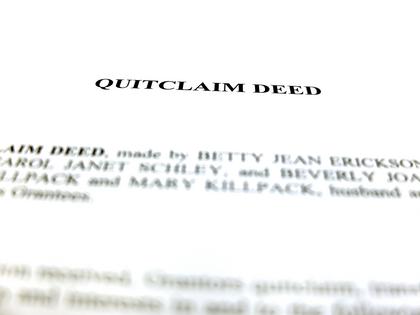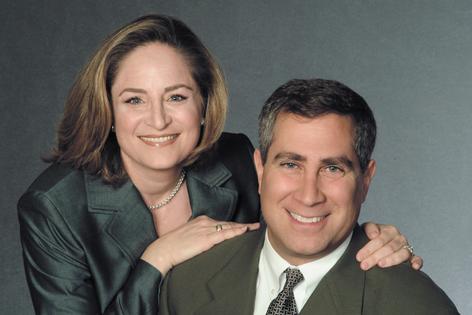Tax implications differ when property is transferred via quitclaim deed
Q: My parents live on two acres of land in Wisconsin, and they own the two acres of land next to them. My parents, my husband and I have agreed that we (my husband and I) will build a house on that extra two acres of land.
An estate attorney sent us to a real estate attorney who recommended that we do a quitclaim deed. The first option was to use a quitclaim deed to put the two acres of land in both my parents’ names our names so there is a total of four of us on the deed. The reasoning was to ensure that my parents still have rights over their land.
The other option was to have a quitclaim deed done that transfers the title over to only my husband and me.
I have a few questions about what the transfer means from a tax perspective. First, if the deed is in all four names vs. only my husband and me, what is our take on the future capital gains tax responsibility if my husband and I were to sell the house we build in the future? And if we take my dad’s cost basis for the land (about $6,000) and the land is now worth $135,000, what happens when we build an $800,000 house on the land? Will we face a massive capital gains tax in the future if the house cost doesn’t get added to the cost basis?
I was going to inherit the land via my parent’s trust, which I understand to be the smarter option. But, we’d like to build now and have my parents move in with us. Are there any other considerations we need to make regarding a quitclaim deed? I see on your website that property taxes could be impacted as well.
A: Yes, from a tax standpoint it would be better to inherit the property than to use a quitclaim deed to put it into your names. Then, you’d inherit the property at its current market value. To use your numbers, if you inherit the land, the cost basis for the land only would jump from $6,000 to $135,000. If you sold the property for $135,000, then you’d owe nothing in capital gains tax.
If your parents give you half of the property, your cost basis for the land would be $3,000, or half of the $6,000 your parents paid to buy the property. And, if you sold that property for $135,000, you would likely owe long-term capital gains tax on your share of the gain. You’d calculate that by subtracting the costs of sale from the sales price ($135,000), then dividing that in half ($67,500) and subtracting your share of the cost basis, or $3,000. You’d then owe capital gains tax on the $64,500 in profits.
But that’s just a small part of the story. Now, you’re going to build an $800,000 house on the land. If you pay for that yourself, then it gets added to the cost basis. Because this becomes your primary residence, the entire property would be subject to the primary residence tax treatment.
In short, it doesn’t really matter whether you use a quitclaim deed to put the property into your name (and your husband’s) or have all four names on the deed. A third option would be to have your parents sell you the property and take back a low-interest loan. They can give you and your husband each $19,500 per year tax free, which you can then use to pay back the loan. In less than four years, the entire value of the property (assuming they sold it to you for $135,000) would be paid off. Whichever way you choose to go, be sure to document the loan and file it with your local recorder of deeds office.
Under current tax law, as long as you’ve lived in your primary residence for two of the past five years, you can keep up to $250,000 (if you’re single) and up to $500,000 (if you’re married) in profits tax free. So, if your cost for the land and home are around $900,000, you could sell your property for around $1.5 million and probably keep the proceeds tax-free, assuming there are some costs of sale (around $100,000) you can subtract from the sales price.
However, the current administration is deciding whether to increase these limits, which haven’t been changed in decades. The $500,000 home sale profit exclusion, applicable to joint filers, was enacted in 1997 by the Taxpayer Relief Act. This landmark legislation replaced previous tax rules for homeowners, including the prior age-based exemption for seniors and the “rollover” provision that allowed deferring gains when buying a replacement home.
In 1998, the National Tax Association released a paper written by the U.S. Department of Treasury and the Congressional Research Service that showed only 3% of homeowners realized profits in excess of the $250,000/$500,000 limits in the Taxpayer Relief Act. But these home sale caps weren’t indexed to inflation. If those caps had been increased to reflect the change in the average housing price between 1998 and 2025, they would now be approximately $720,000 and $1,440,000, respectively.
If the home sale caps were increased to these levels, and you eventually sold the property for $2 million, you’d pay nothing in capital gains tax. That’s the good news for you — if the home sale caps are increased.
Why would the administration do this? As we’ve written many times in this column, there is an acute housing shortage at the moment. Various housing economists say the U.S. is short between 4 million to 7 million homes. Home prices are still rising, even as interest rates have stayed relatively high. Lowering interest rates without building more housing stock will likely push home prices even higher, so fewer people will be able to afford to buy.
What if you find a way to put more homes on the market? The administration believes that if you can get homeowners to sell their homes and realize substantial profits tax free, more homes will be listed. If supply increases, the thinking goes, then prices will stabilize or even fall.
Perhaps. More likely, people with cash will rush into the marketplace and snap up these homes. And the sellers will have to move somewhere else. If the supply of homes is still in short supply, where would these home sellers move to? It’s folly to assume they will rent an apartment. Some might. But the vast majority will want to buy something else, putting additional pressure on the market.
A final point to keep in mind: Even if you raise the home sale exemption, according to the Yale Budget Lab, in 2022 only about 10% of homeowners had gains exceeding the $500,000 tax exemption. Their research found that those with gains above exemption are “wealthier, higher-income, and older than homeowners below the threshold. In 2022, the average net worth for this group was $5.7 million.”
========
(Ilyce Glink is the author of “100 Questions Every First-Time Home Buyer Should Ask (4th Edition).” She writes the Love, Money + Real Estate Newsletter, available at Glink.Substack.com. Samuel J. Tamkin is a Chicago-based real estate attorney. Contact Ilyce and Sam through her website, ThinkGlink.com.)
©2025 Ilyce R. Glink and Samuel J. Tamkin. Distributed by Tribune Content Agency, LLC.
































Comments